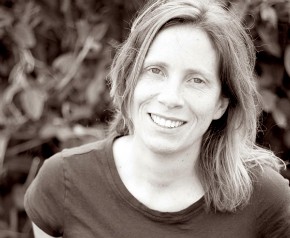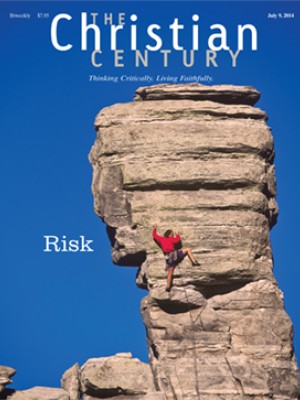Wrestling with God: Poet and editor Kimberly Johnson

Kimberly Johnson and her husband, Jay Hopler, are both poets, and they have published an anthology of devotional poetry, Before the Door of God: An Anthology of Devotional Poetry (Yale University Press). The book ranges from ancient to contemporary writers, tracing the development in English of poetry addressed to God.
What does the term devotional mean in your book title?
We see the devotional lyric as one in which the speaker is wrestling with and often speaking to a divine addressee. That private, in-turned, wrestling approach to both poetry and the divine is what we were looking for.
We wanted to distinguish this kind of poetry from inspirational poetry. And devotional poetry is not necessarily “religious poetry”—that phrase casts a huge net and can involve polemics or laying out sectarian positions or creeds.
If the poem is not wrestling, then it is not poetry. It is a greeting card.
How did you lay out historical periods?
The first section includes the psalms and some Greek and Roman writers who were not Jewish or Christian. We included them because their methods of framing the relationship between the human and the divine influenced later Christian poets.
Then we move into the early church fathers through the medieval period. We have an entire section devoted just to psalm translations, which was a fad in the 16th and 17th centuries as people discovered the multiplicities of meanings that English had available. Then we cover the Renaissance, the 18th and 19th centuries, modern poetry, and contemporary poetry. One of the most recent poets in the contemporary section was born in 1982.
Read our latest issue or browse back issues.
How does devotional poetry change over the course of time?
In antiquity, the “I” that speaks to God is simultaneously individual and corporate. In the oldest devotional poetry, it is hard to distinguish a lyric poem from a hymn. A hymn speaks on behalf of a congregation. It petitions a god for a communal favor. Over time that “I” becomes increasingly isolated and even unreconciled to a community. In the final section, there is a lot of very personal and profound wrestling that feels like it has to wrestle because of its isolation.
Practically speaking there is not a lot of difference between the “I” of Psalm 22, for example, and a contemporary speaker who speaks from a place of isolated despair. But it gets interpreted and used very differently. Yes, the “I” of the psalm is the soul, but it is also speaking on behalf of Israel: I am broken/we are broken. It is really difficult to take a poem by a contemporary poet such as Mary Szybist or Josh Bell, for example, and say they speak for a community. The biblical language is appropriable by all of us. An isolated, struggling 21st-century voice tells his or her own story.
What was the most difficult period to cover?
For me it was the time between the 18th and the 20th centuries, in part because I am least moved by that period of poetry. During the ascendancy of European rationalism, the devotional aspect of poetry was suppressed for around 200 years, only to claw its way back up through modernism—ironically perhaps.
In T. S. Eliot one sees a rich engagement with spiritual tradition. Most people think of modernist poetry as this godless rejection of great traditions, but Eliot was a deeply religious man, and his poetry reflects his careful thinking about the symbols that permeate the Christian tradition. Eliot is a champion of devotional poetry in the 20th century.
How is the anthology being received by both secular and religious audiences?
People are appreciating its breadth. It is a big doorstop of a book. Because we approached it as scholars, the trajectory of the book makes sense to scholarly and secular audiences. We are tracing the development of a poetic tradition. The only occasional hesitancy comes from religious quarters. People open it up and think it is going to be a devotional manual. It is not that. It is an investigation of a tradition. We wanted to show the complicated history of devotional poetry. There are celebratory poems and some angry ones. Some say things like, “God, I don’t believe in you.” But what an interesting gesture: to speak directly to a God the poet doesn’t believe in.
We’ve heard people say that they wish that more diverse traditions were represented. Why is Confucian poetry not included? We were limiting ourselves to the Anglophone tradition, which until the past 50 years did not have many diverse influences. There weren’t Muslim voices of the 15th century that Christians were reading.
How might you imagine clergy using this volume of poetry?
Pastors often have the responsibility of saying: the biblical canon is not a grand thing standing out beyond our ken, but it is actually something that we can connect to ordinary life. In Before the Door of God, there are many examples of people doing that. Poetry lays the foundation for that kind of personal exploration and questioning. Poetry invites you to have an experience. It doesn’t want you to drift away into inattention. It wants to grab you. It speaks emotionally, intellectually, and physically all at once.
Teaching John Milton, I have cried in front of my class over the first 40 lines of book three of Paradise Lost because the poetry takes remote and abstract ideas and punches you in the gut with them. As such, poetry is an enormously effective communicative tool. The more you read, the more that connection happens.







